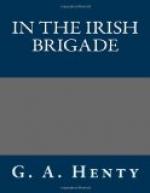“I suppose the real fact was, Kennedy, that he was glad to get rid of you altogether?”
“I think that is likely enough. He certainly raised no objection, whatever, to my going abroad, and seemed to think it natural that I should choose the Irish Brigade, here, in preference to the British service. He said something unpleasant about its not being singular that I should be a rebel, when I always associated with rebels, to which I replied that it seemed to me that I could hardly be blamed for that, seeing that my father had been what he called a rebel, and that I had little choice in the matter of my associates; and that if I had been educated at a school in England, instead of by good Father O’Leary, I might have had other sentiments. He replied that my sentiments were nothing to him, one way or the other. He was glad to wash his hands of me altogether; and, at any rate, if I went to France, I could drink the health of King James every day without his being involved in my treason.”
“It almost looked as if he wished you to grow up a rebel, Kennedy, or he would hardly have placed you in the charge of a priest. He may have reckoned that if there was another rising, you might join it, and so be taken off his hands, altogether.”
“Whatever the reason was, I have certainly cause for satisfaction that he removed me from the care of the farmer’s wife, with whom he at first placed me, and arranged with the priest to take charge of me altogether. O’Leary himself had been educated at Saint Omer, and was a splendid fellow. He was very popular on the countryside, and it was owing to my being with him that I was admitted to the houses of the gentry around, whereas, had I remained in the farmhouse in which O’Carroll first placed me, I should only have associated with the sons of other tenants.”
“It looked, at any rate, as if he wished to make a gentleman of you, Kennedy.”
“Yes, I suppose my father had asked him to do so. At any rate, I was infinitely better off than I should have been if he had taken me in at Kilkargan, for in that case I should have had no associates, whatever. As it was, I scarcely ever exchanged a word with him, until that last meeting. He sent down, by one of his servants, the letter to the Duc de Noailles, and a bag containing money for my outfit here, and for the purchase of a horse, together with a line saying that he had done his duty by me, and had no desire to hear from me in the future. I was inclined to send the money back to him, but Father O’Leary persuaded me not to do so, saying that I must be in a position to buy these things, if I obtained a commission; and that, no doubt, the money had been given me, not for my own sake, but because he felt that he owed it to me, for some service rendered to him by my father.”
“It was an ungracious way of doing it,” O’Sullivan said, “but, in your circumstances, I should have taken the money had it come from the old one himself. It is, perhaps, as well that it should have been done in such a manner that you may well feel you owe no great gratitude towards such a man.”




